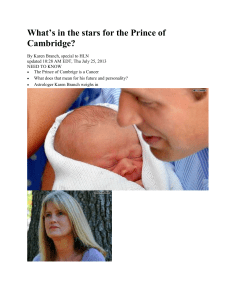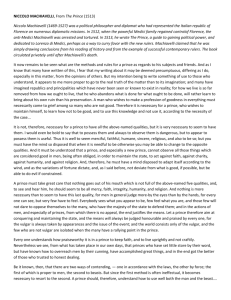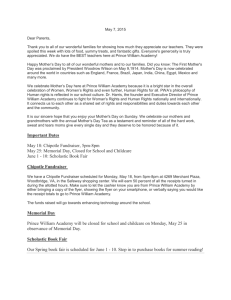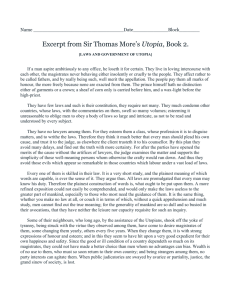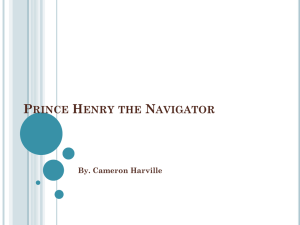Robert de Courçon, Statutes for the University of Paris, 1215
advertisement
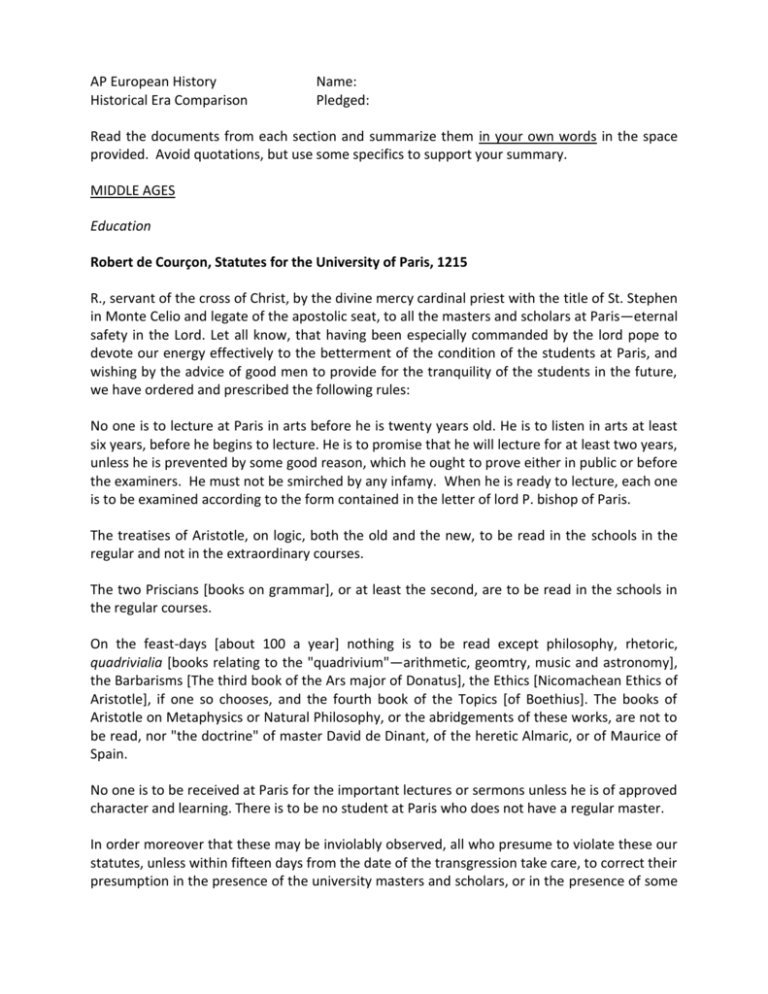
AP European History Historical Era Comparison Name: Pledged: Read the documents from each section and summarize them in your own words in the space provided. Avoid quotations, but use some specifics to support your summary. MIDDLE AGES Education Robert de Courçon, Statutes for the University of Paris, 1215 R., servant of the cross of Christ, by the divine mercy cardinal priest with the title of St. Stephen in Monte Celio and legate of the apostolic seat, to all the masters and scholars at Paris—eternal safety in the Lord. Let all know, that having been especially commanded by the lord pope to devote our energy effectively to the betterment of the condition of the students at Paris, and wishing by the advice of good men to provide for the tranquility of the students in the future, we have ordered and prescribed the following rules: No one is to lecture at Paris in arts before he is twenty years old. He is to listen in arts at least six years, before he begins to lecture. He is to promise that he will lecture for at least two years, unless he is prevented by some good reason, which he ought to prove either in public or before the examiners. He must not be smirched by any infamy. When he is ready to lecture, each one is to be examined according to the form contained in the letter of lord P. bishop of Paris. The treatises of Aristotle, on logic, both the old and the new, to be read in the schools in the regular and not in the extraordinary courses. The two Priscians [books on grammar], or at least the second, are to be read in the schools in the regular courses. On the feast-days [about 100 a year] nothing is to be read except philosophy, rhetoric, quadrivialia [books relating to the "quadrivium"—arithmetic, geomtry, music and astronomy], the Barbarisms [The third book of the Ars major of Donatus], the Ethics [Nicomachean Ethics of Aristotle], if one so chooses, and the fourth book of the Topics [of Boethius]. The books of Aristotle on Metaphysics or Natural Philosophy, or the abridgements of these works, are not to be read, nor "the doctrine" of master David de Dinant, of the heretic Almaric, or of Maurice of Spain. No one is to be received at Paris for the important lectures or sermons unless he is of approved character and learning. There is to be no student at Paris who does not have a regular master. In order moreover that these may be inviolably observed, all who presume to violate these our statutes, unless within fifteen days from the date of the transgression take care, to correct their presumption in the presence of the university masters and scholars, or in the presence of some appointed by the university, by the authority of the legation with which we are entrusted, we bind with the bond of excommunication. Done in the year of grace 1215, in the month of August. Political Theory John of Salisbury, Policraticus, Book Four, 1159 OF THE DIFFERENCE BETWEEN A PRINCE AND A TYRANT AND OF WHAT IS MEANT BY A PRINCE Between a tyrant and a prince there is this single or chief difference, that the latter obeys the law and rules the people by its dictates, accounting himself as but their servant. It is by virtue of the law that he makes good his claim to the foremost and chief place in the management of the affairs of the commonwealth and in the bearing of its burdens; and his elevation over others consists in this, that whereas private men are held responsible only for their private affairs, on the prince fall the burdens of the whole community. Wherefore deservedly there is conferred on him, and gathered together in his hands, the power of all his subjects, to the end that he may be sufficient unto himself in seeking and bringing about the advantage of each individually, and of all; and to the end that the state of the human commonwealth may be ordered in the best possible manner, seeing that each and all are members one of another. Wherein we indeed but follow nature, the best guide of life; for nature has gathered together all the senses of her microcosm or little world, which is man, into the head, and has subjected all the members in obedience to it in such wise that they will all function properly so long as they follow the guidance of the head, and the head remains sane. Therefore the prince stands on a pinnacle which is exalted and made splendid with all the great and high privileges which he deems necessary for himself. And rightly so, because nothing is more advantageous to the people than that the needs of the prince should be fully satisfied; since it is impossible that his will should be found opposed to justice. Therefore, according to the usual definition, the prince is the public power, and a kind of likeness on earth of the divine majesty. For all power is from the Lord God, and has been with Him always, and is from everlasting. The power which the prince has is therefore from God, for the power of God is never lost, nor severed from Him, but He merely exercises it through a subordinate hand, making all things teach His mercy or justice. "Who, therefore, resists the ruling power, resists the ordinance of God," [Romans 13:2] in whose hand is the authority of conferring that power, and when He so desires, of withdrawing it again, or diminishing it. For it is not the ruler's own act when his will is turned to cruelty against his subjects, but it is rather the dispensation of God for His good pleasure to punish or chasten them. RENAISSANCE Education Peter Paul Vergerio, On Noble Manners and Liberal Studies, c. 1404 We call those studies liberal which are worthy of a free man; those studies by which we attain and practice virtue and wisdom; that education which calls forth, trains and develops those highest gifts of body and of mind which ennoble men, and which are rightly judged to rank next in dignity to virtue only. For to a vulgar temper gain and pleasure are the one aim of existence; to a lofty nature, moral worth and fame. It is, then, of the highest importance that even from infancy this aim, this effort, should constantly be kept alive in growing minds. For I may affirm with fullest conviction that we shall not have attained wisdom in our later years unless in our earliest we have sincerely entered on its search. Not that education, in the broad sense, is exclusively the concern of youth. Did not Cato think it honorable to learn Greek in later life? Did not Socrates, greatest of philosophers, compel his aged fingers to the lute? We come now to the consideration of the various subjects which may rightly be included under the name of 'Liberal Studies.' Amongst these I accord the first place to History, on grounds both of its attractiveness and of its utility, qualities which appeal equally to the scholar and to the statesman. Next in importance ranks Moral Philosophy, which indeed is, in a peculiar sense, a 'Liberal Art,' in that its purpose is to teach men the secret of true freedom. History, then, gives us the concrete examples of the precepts inculcated by philosophy. The one shows what men should do, the other what men have said and done in the past, and what practical lessons we may draw therefrom for the present day. I would indicate as the third main branch of study, Eloquence, which indeed holds a place of distinction amongst the refined Arts. By philosophy we learn the essential truth of things, which by eloquence we so exhibit in orderly adornment as to bring conviction to differing minds. And history provides the light of experience—a cumulative wisdom fit to supplement the force of reason and the persuasion of eloquence. For we allow that soundness of judgment, wisdom of speech, integrity of conduct are the marks of a truly liberal temper. As to Music, the Greeks refused the title of 'Educated' to anyone who could not sing or play. Socrates set an example to the Athenian youth, by himself learning to play in his old age; urging the pursuit of music not as a sensuous indulgence, but as an aid to the inner harmony of the soul. In so far as it is taught as a healthy recreation for the moral and spiritual nature, music is a truly liberal art, and, both as regards its theory and practice, should find a place in education. Arithmetic, which treats of the properties of numbers, Geometry, which treats of the properties of dimensions, lines, surfaces, and solid bodies, are weighty studies because they possess a peculiar element of certainty. The science of the Stars, their motions, magnitudes and distances, lifts us into the clear calm of the upper air. There we may contemplate the fixed stars, or the conjunctions of the planets, and predict the eclipses of the sun and the moon. The knowledge of Nature—animate and inanimate—the laws and the properties of things in heaven and in earth, their causes, mutations and effects, especially the explanation of their wonders (as they are popularly supposed) by the unraveling of their causes—this is a most delightful, and at the same time most profitable, study for youth. Political Theory Niccolo Machiavelli, The Prince, 1513 CONCERNING THE WAY IN WHICH PRINCES SHOULD KEEP FAITH Every one admits how praiseworthy it is in a prince to keep faith, and to live with integrity and not with craft. Nevertheless our experience has been that those princes who have done great things have held good faith of little account, and have known how to circumvent the intellect of men by craft, and in the end have overcome those who have relied on their word. You must know there are two ways of contesting, the one by the law, the other by force; the first method is proper to men, the second to beasts; but because the first is frequently not sufficient, it is necessary to have recourse to the second. Therefore it is necessary for a prince to understand how to avail himself of the beast and the man. This has been figuratively taught to princes by ancient writers, who describe how Achilles and many other princes of old were given to the Centaur Chiron to nurse, who brought them up in his discipline; which means solely that, as they had for a teacher one who was half beast and half man, so it is necessary for a prince to know how to make use of both natures, and that one without the other is not durable. A prince, therefore, being compelled knowingly to adopt the beast, ought to choose the fox and the lion; because the lion cannot defend himself against snares and the fox cannot defend himself against wolves. Therefore, it is necessary to be a fox to discover the snares and a lion to terrify the wolves. Those who rely simply on the lion do not understand what they are about. Therefore a wise lord cannot, nor ought he to, keep faith when such observance may be turned against him, and when the reasons that caused him to pledge it exist no longer. If men were entirely good this precept would not hold, but because they are bad, and will not keep faith with you, you too are not bound to observe it with them. But it is necessary to know well how to disguise this characteristic, and to be a great pretender and dissembler; and men are so simple, and so subject to present necessities, that he who seeks to deceive will always find someone who will allow himself to be deceived. One recent example I cannot pass over in silence. Alexander the Sixth did nothing else but deceive men, nor ever thought of doing otherwise, and he always found victims; for there never was a man who had greater power in asserting, or who with greater oaths would affirm a thing, yet would observe it less; nevertheless his deceits always succeeded according to his wishes, because he well understood this side of mankind. Therefore it is unnecessary for a prince to have all the good qualities I have enumerated, but it is very necessary to appear to have them. And I shall dare to say this also, that to have them and always to observe them is injurious, and that to appear to have them is useful; to appear merciful, faithful, humane, religious, upright, and to be so, but with a mind so framed that should you require not to be so, you may be able and know how to change to the opposite. And you have to understand this, that a prince, especially a new one, cannot observe all those things for which men are esteemed, being often forced, in order to maintain the state, to act contrary to fidelity, friendship, humanity, and religion. Therefore it is necessary for him to have a mind ready to turn itself accordingly as the winds and variations of fortune force it, yet, as I have said above, not to diverge from the good if he can avoid doing so, but, if compelled, then to know how to set about it. MIDDLE AGES Art Architecture Music RENAISSANCE Art Architecture Music Resolved: The Renaissance represents a distinct break from the Middle Ages. Take a position on this question and fill out the chart below. Effective arguments will take into account as many of the areas above as possible. Generalizations should not be based solely on, say, art or political theory. Look for a theme that runs through each of the topic areas. Argument 1 Evidence to support: A. B. C. Argument 2 Evidence to support: A. B. C. AP European History Historical Era Comparison As you view the slides, you should take notes and/or sketch the art. Architecture Middle Ages—Romanesque 1. Notre Dame la Grande Church, France, facade 2. St. Vitale, Ravenna, Italy, interior Middle Ages—Gothic 3. Windsor Castle, England 4. Chartres Cathedral, France, facade 5. Notre Dame Cathedral, France, south flank 6. Notre Dame Cathedral, France, interior nave 7. Sainte-Chapelle, France, interior of upper chapel Renaissance 8. Santa Maria del Fiore Cathedral, Florence, dome and campanile, by Giotto and Brunelleschi 9. San Lorenzo, Florence, by Brunelleschi, interior nave 10. San Pietro in Montorio Tempietto, Rome, exterior by Bramante 11. Palazzo Rucellai, Florence, exterior by Alberti 12. Palazzo Publico, Siena, Italy Art Middle Ages 13. Chartres Cathedral, France, rose window and stained glass 14. Les Tres Riches Heures du Duc de Berry, February scene 15. Stigmatization of St. Francis, Assisi, by Giotto 16. Well of Moses Pulpit, Monastery of Champmol, France, by Sluter & de Wevre Renaissance 17. Holy Trinity with Virgin and St. John, Florence, by Massaccio 18. Creation of Adam, Sistine Chapel, Vatican, by Michelangelo 19. The Last Supper, Santa Maria della Grazie, Milan, by da Vinci 20. Birth of Venus, Florence, by Botticelli 21. David, Florence, by Michelangelo 22. School of Athens, Vatican, by Raphael




